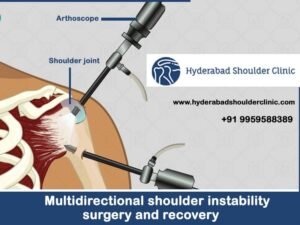A frozen shoulder is a chronic condition and the patient should seek immediate medical treatment. One should not confuse a frozen shoulder with pain and loss of movement/motion since a frozen shoulder is commonly caused by inflammation (swelling, pain and irritation) of the tissues surrounding the joint, which is more painful. One can also see a gradual loss of movement in the shoulder (glenohumeral) shoulder joint. The shoulder joint comprises “a ball – the humeral head and socket – the glenoid”. The shoulder joint is the most versatile and mobile in the body. However, when the shoulder is frozen, the joint becomes stuck, and its movement is limited.

How does Frozen Shoulder progress?
Frozen shoulder has three stages:
Freezing phase: This is painful, and one gradually loses range of motion. Pain intensifies at night and in lying down position. If left untreated, this phase could last between 2 and 6 weeks.
Frozen phase: This is known as the stiffening phase, and the pain stops. Night sleep is a little better; this phase can last roughly 2–6 months.
Thawing phase: In this phase, the shoulder’s movement starts to become normal again, which can take about six months to 2 years.
Most people start noticing their symptoms in the freezing to frozen stages because of the pain and stiffness limiting function.

The Top Do’s and Dont’s of Frozen Shoulder Management
1- Do An Early consultation.
One common mistake of frozen shoulder patients is to self-diagnose and self-treat the condition, but this will only person the problem.
The Healthcare provider will start by physically examining your shoulder’s range of motion. They will ask you to touch your opposite shoulder or reach across your hip and test the passive range of motions as well. They will relax your muscles and move the joint in different directions, and in some cases, they may order an x-ray to rule out any dislocation or arthritis.
An experienced surgeon will discuss the treatment problem with you and also give you instructions regarding rest, exercise and diet. A physical therapist consultation is also recommended; if the pain is too much, they might provide pain medications to ensure a smooth recovery.
2- DO: Massage Your Frozen Shoulder
A frozen shoulder is a deep joint issue, not just surface-level pain. So go ahead and massage the muscles around your shoulder for relief. Though the shoulder capsule is the most affected area, however when not used, the muscles surrounding the shoulder joint can become tight. The affected muscles due to the shoulder joint are the pecs/chest, upper trapezius, and deltoid.
3-DO: Know your sleep pattern.
It is evident that sleeping on the affected shoulder can aggravate the pain. So please sleep on your back or your opposite shoulder, and place a pillow under the armpit of the affected shoulder to prop it in a comfortable position. By practising this sleeping position, you’ll get a chance to fall asleep for some time. Good sleep is a part of healing, decreasing inflammation, and improving your pain threshold.
4- DO: Physical Therapy Exercises must be practised as prescribed
Stretching exercises help increase your mobility, help stretch the shoulder, and reduce pain and discomfort. One can practise:
- Do the stretches for about 30 secs to fully stretch out the restricted capsule.
- One can stretch up to a point where you feel some tension in your shoulder. But be mindful that you do not get a sharp pain or experience any lingering pain.

5- Do – Strengthening programme at the appropriate time.
The shoulder joint needs flexibility and strength to perform its duties. After you regain the flexibility, please start a strengthening program. This phase commences much later in your treatment regimen. During the treatment, the shoulder is not used as much, which leads to stiffness and pain, and the surrounding muscles become weak. So if one wants to resume lifting, reaching, and carrying, one has to regain shoulder strength.
1- Don’t: Strengthen The Muscles Too Early
As the muscles around your shoulder joint also tighten, do not improve the tightness by strengthening them too early, as it can lead to other injuries later. An experienced shoulder surgeon will take measurements during each visit to ensure you’re on the right track. If the results show that the numbers are decreasing due to “overworking” the shoulder, that’s not a good sign.
2- Don’t: Force Your Shoulder to Do Painful Activities
This includes sleeping, which was already addressed.
Do not perform repetitive motions of your shoulder or lift and carry objects overhead that are too heavy for your shoulder to handle. These actions can irritate your shoulder and cause more pain and discomfort.
3- Don’t: Stop Physical Therapy Prematurely
Unless you aren’t able to attend therapy for financial or logistical reasons, you should not stop going. If you must stop, tell your therapist in advance, so they can draw up a home exercise plan for you to continue at home. Premature closure of treatment could be detrimental to your function later. One might be unable to regain their shoulder’s full range of motion and strength.
4- Don’t: Neglect your diet.
Diet plays a vital role in healing the frozen shoulder. A frozen shoulder patient might also suffer from low-grade systematic inflammatory conditions. This means that your body needs healthy anti-inflammatory food to heal. A healthy diet also helps maintain your general health because a frozen shoulder patient might have a sedentary lifestyle until the shoulder is healed completely.
5-Dont: Smoke and Drink Alcohol
Smoking and drinking alcohol, and using other recreational drugs seriously hampers the body’s ability to heal. If the patient has pre-existing conditions such as diabetes or hypertension, then smoking and alcohol consumption will worsen the condition. If you cannot stop these habits, please consult an expert who can help you control these health-damaging habits.
Healing of a frozen shoulder largely depends upon the patient’s self-care. All the points discussed above should be followed religiously, and if you have any trouble, please consult our expert shoulder surgeon Dr Chandra Sekhar at Hyderabad shoulder clinic. Please visit our website https://hyderabadshoulderclinic.com/ or reach us at +91 9959588389, shoulderandsportsclinic@gmail.com





